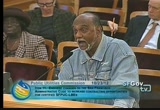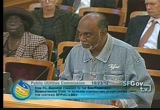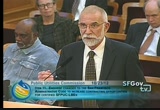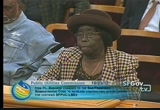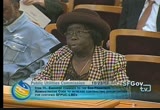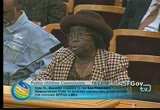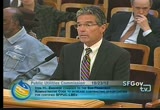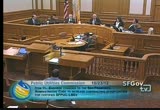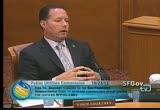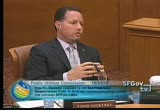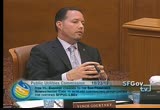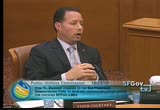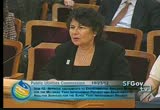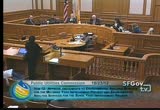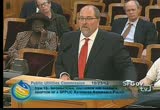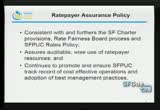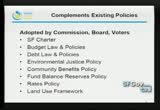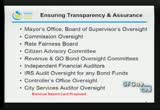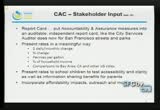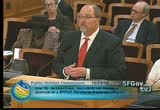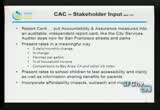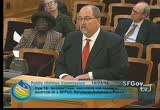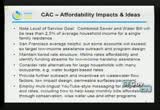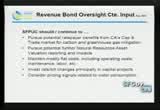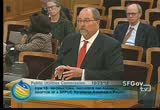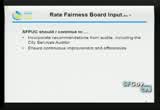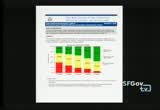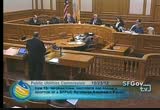tv [untitled] November 8, 2012 5:00am-5:30am PST
5:00 am
and i can relay this project by project, and i have before harlan kelly, ed harrington, karen cubic, tyrone ju, and they kind of understand about this situation. now, what we have here is we have the hrc abruptly transferring compliance officers who deal with lb situations and other compliance officers to the city administrator's office. then you have you guys in the middle of the situation changing the rules without
5:01 am
really getting the input from the lbes. nobody who is not a san franciscan should come here and say, i spoke to some lbes in san francisco and they kind of agree to go with the flow. that doesn't work. we don't want to badger sfpuc. but the fact is we lost on the waste system improvement project, and we were not, i repeat, not lose on the sewer system improvement project. because i have over 500 young men, i brought some of them here. i don't want to fill this chamber with some strong men. i don't want to go there, but we will not lose unless we have meaningful discussion with the union involved. thank you very much. >> thank you very much. yes, sir.
5:02 am
thank you, commissioners, art jensen with bosca. i think this is a great thing the commission did when they extend it had to a regional program to include workers outside san francisco that are paying two-thirds of the water bills and contributing to the success of the system. one question i had about the wording, and i think it's fine the way i interpret it. it talks about projects done in conjunction with bosca member agencies where there is a cost sharing arrangement. and i wanted to mayke it simply matt i can this afternoon. if that includes projects not only on behalf of member agencies and with member agencies, but also projects done by san francisco bosco which san francisco hold the contracts on, in the event we do have a joint project, does this as it's written cover that possibility. i would read it that way --
5:03 am
>> the answer is yes. okay, thank you very much. >> and you're okay with the other language? yes. >> all right. counsel, do you have anything to add since this came out of your office? >> no, commissioner. >> yes. ms. jackson. espinola jackson. when i recertify, you know, i have some concerns as other people in my community because a lot of the contractors were dee-certified sometime ago. and we are mostly concerned about the local hiring aspect that the city approved. but the one problem that i have with the city and county of san francisco is that we have compliance officers, mostly all of the departments. but we don't have state certified compliance officers
5:04 am
or federal. and what happens is, i mentioned to director harrison in the hallway 2001 day, i said, you don't have anyone that can go out on these job sites to see whether or not the people that are on these jobs are from the city and city and county of san francisco. he says to me, well, espinola, all i do is put on my hard hat and i go on a job site. * i said, yes, look who you are. you're the money man. so, you can do what you please. but you don't write reports to the state about the contractors and whether or not they are abiding by the law. and he looked at me. he said, i never thought about that. and, you know, it hurts me for the last 50 years dealing with human rights is that their wings have been clipped in
5:05 am
order not to make sure that residents of san francisco are included. and you'll need to check just to see how many of these do we have in the city and how many of them are of color and how many of them actually get contracts to do construction work here in san francisco. it's sad, because we know for a fact if a contractor lives in this city, he's going to hire people from the community and from the city and county of san francisco. so, when mr. dee costa speak, he's speaking of what we see and have been seeing over the years. and there needs to be some corrections. so, i don't know how to go into your -- and see if all the wordingses are correct, but maybe you can make sure something is there stating the fact what really needs to be done in the city and county of san francisco. thank you very much.
5:06 am
* >> i think staff heard that. we'll proceed to figure out just how to make that clear. thank you. counsel, we'll have a conversation. all right. any other comments? i have a russell ruby, welcome. my apology, that's randal ruby. >> i'm sorry, randal. i'm with united contractors. we represent over 400 engineering contracting and construction related firms throughout northern california, a number of which are stated right here in san francisco and the city and county. and we want to just go on record as endorsing these changes. we urge the commission to approve and endorse these changes and recommend to the city and county board of supervisors that they adopt. >> all right, thank you very much. any other comments on this item? yes.
5:07 am
veronica [speaker not understood],. i just want to clarify one thing regarding the revision that it has been endorsed by the human rights commission advisory committee as well as the human rights commission, full commission. >> all right. duly noted. any other comments on this item? is there a motion? -- to reflect these changes? >> i'll move it. >> all right, commissioner moran. is there a second? >> second. >> all right. let's note that the management and labor came together on this motion. all those in favor signify by saying aye. i'm sorry, you want to speak to the motion? >> i do. thank you, president torres. i'm sensitive to the comments that we heard certainly from my brothers and sisters in the carpenters union. in just a moment about that, bob i alvarado who president torres mentioned earlier, is a
5:08 am
colleague of oscar de la or he and the carpenters and the laborers are probably the most progressive inclusive trade unions in the region. * bobby it's not even close. in terms of really -- not just allowing things to happen, but planning and strategizing about how to put people to work in our communities. that being said, while i reside in the city and county of san francisco and have for my entire life, i have loyalties and allegiances towards the membership and the workers who live right here right now. and, so, i'm kind of torn. because we do have this regional commitment and that's what's before us now. the carpenters that show up today, they're not necessarily from the san francisco local. that's local 22. that's pat mull i began.
5:09 am
-- mulligan. i was negotiating for 261 members who live in marin county. so, we've always been kind of confronted with this what's good for san francisco versus what's good for working people in general. and i'm sensitive to that. we support local hires, for example, to the detriment of the union members that live outside of this county. those union members that live in san mateo county and those union members that live in marin county. the item before us, i see is slated to go before the san francisco board of supervisors. those officials, they don't have those same concerns. they solely represent or concern themselves with the plight of working people who live here in this town. that is why i'm inclined to move this item along for their consideration. because while i always love to see a whole bunch of big strong working guys in a room, i think
5:10 am
the conversation probably is better had over there. and i think it would be wrong for us to -- it would be wrong for us given the fact that we do have a labor management partnership. i know exactly who represents the employers and it really is about creating those work opportunities. i'm going to also say that i'm going to make myself available, not just to the people that are members of these labor organizations that i mentioned, but also the other organizations, but more importantly, i think the labor unions, the two i just mentioned and others are so sensitive and so in touch with our responsibilities in the community to open those doors and to facilitate work opportunities for the people that actually were part of this now before a lot of these union members came into the town. so, i'm hoping i can get some help from the people and the public to do that because i do recognize that there are conversations that have to take
5:11 am
place with respect to these lbes. to the brothers and sisters that showed up today, i'm with you 100%. to the contractors who are here today, i'm with you 100%. but to the people that live in the city and county of san francisco, to the people that want this work to go to local businesses and to local contractors, you know, now i have to put my money where my mouth is and make the time to sit down and figure out if this can be better, we need to talk about making it better. and if there's things we need to take outs of it we need to talk about that. that would probably be across the hall. so, my vote is obviously to move it forward. >> any other comments? all those in favor signify by saying aye. >> aye. >> all those opposed? abstein shad, motion carries. item number 2. 12. >> item 12, [speaker not understood] authorize the
5:12 am
general manager to execute these amendments each with a time extension of four years with no change to the value of the agreement. * >> are you -- yes. >> i was thinking that you would just say are there any questions and eula prove it. but if you'd like a little presentation, i can -- >> not a presentation, just a brief concise statement. >> sure. we have two agreements, both with [speaker not understood] corporation to prepare environmental documents for the suno yard and mill braae yard, improvement projects. and we started in may of 2010. planning and design has gone on. there have been changes in the plans. we've given it a lot of consideration for both yards and therefore the environmental review process as being slow. and for that reason we are
5:13 am
asking for a four-year extension for both agreements. it probably won't take four years, but we don't want to come back to you again to ask for another extension. so, this is the reason for this action. and we're not asking for any additional fund. we think we have sufficient fund in the agreements to complete the work. >> and who came up with a four-year period? that's what i was wondering. >> the bureau of environmental management which i didn't introduce myself. i'm sorry, and the manager. >> so it was you and your is that of that came up with the four-year amendment? >> yes. >> that can come up with -- >> sure, shorten it or lengthen it. >> all right. any questions, any public comment? is there a motion? >> so moved. >> seconded? all those in favor by saying aye? >> aye. >> opposed, abstentions, none. carried. thank you very much. >> thank you.
5:14 am
>> item 13. >> item 13, informational discussion and possible adoption of sfpd rate payer assurance policy. >> good afternoon, todd reese from assistant manager cfo. i want to thank you for the opportunity to look and work on this item. in particular, it gave me a chance to get out and visit with the rate service board, with the citizens advisory committee and also the revenue bond oversight committee and a number of folks, as well as go through the records and discussions that you've had as far as your ideas on how to make sure that we're well serving and best serving the rate payers and keeping things as affordable as possible. what you have before you today is a consolidation of all those notes and all those thoughts, many of which you deserve the credit for providing those to this report. and i also have a few brief slides to walk through to share with you what the citizens advisory committee that rate fairness board and our thoughts have shared, so, if i might do
5:15 am
that. in your packet starting on page 6 item 13 is where the presentation begins. and it is in particular looking at a rate payer assurance policy. and this rate payer assurance policy is a policy to complement the many policies that you have now. you are governed and guided by the charter mandate of requirement under rate payer assurance as the voter told us to enact in 2002 in particular, one of the most recent and largest items. in addition to that, that san francisco charter provision as well as prop e and prop a in 2002, the rate service process is put into place. and you've also recently adopted during the last budget process the rates policy. this rate payer assurance policy both furthers that transparency, furthers that oversight that you see and that
5:16 am
you help govern here in san francisco. it assures that auditable wise use of rate payer services will continue to promote and ensure that the sfpuc stays on a strong track record of effective management. one of the -- also thing in the discussions with the various stakeholder groups is to walk through all the already adopted policies and provisions and protections in place. for the public, just quickly walking through the list, there are many. there is the san francisco charter, there is the budget laws and policies, the debt laws and policies, the environmental justice policy, the community benefits policy, the fund balarie serve policy, the rates policy and the land use framework. and i go through that long list because it does provide assurances and many of which are very targeted and deliberate because of your oversight and your desire to have them. so, i think that was helpful. and i think the citizens advisory committees, the revenue bond oversight committee and the rate fairness board appreciate that and knowing that and going through
5:17 am
that list as well. in addition to the goal that i know you and former president moran had, the assurance of transparency, we also reviewed what transparency and oversight we have now. and that includes your oversight as well as the mayor's office, the board of supervisors, the rate fairness board, of course the citizens advisory committee and all their subcommittees, which are very helpful and informative and the policy process and the information process. the revenue bond oversight committee. and we're also subject to the general obligation bond oversight committee for our auxiliary water supply system funding. we also are overseen by the independent financial auditors, the irs oversight for any bond funding that we do as well as the independent controller's office oversight and as passed in 2003 and enaccount aed in 2004 by the voters, prop c city services auditor oversight. and that may be an opportunity as well to further make audits
5:18 am
verifiable, any potential rate payer assurance policy. what is the citizens advisory committee say? they said that this all sounds very good basically, but they want it in an easy to use report card file format, and that there is a heck of a lot of good information and requirements now. but to put it in a digestible usable way, that would be best set and the public can understand and really appreciate and have accessible accountability and assurance. >> and where would it be published? >> that is an opportunity for us to do it on our website, to put it in our popular annual report and put it into our comprehensive annual financial report, and to really put it in bill inserts or otherwise. it would provide a pretty far-reaching opportunity. they focus as well -- >> that is your intent is what you're saying? >> i'm saying that the possibility is really quite
5:19 am
good to be able to get it out in front. i'm not proscribing that we have to do that, but to the degree we want to, much like already required by city ordinance and by street a voters told the city to do back in 2003-2004 with proposition c, this may be an opportunity for us to get out our message and to say just how well and how effectively and how cost efficiently and how affordably we're providing 24/7 service to customers. so, it could be an opportunity. >> what what is the average household income in san francisco now, that the 2.5% would be based upon? >> it's $73,000 a year. >> do you know what it is statewide? >> it's lower than that. >> right. >> and i don't have it in front of me, but i'll find that -- >> whenever you get a chance, thanks. >> the other really interesting comments from the citizens have iery committee, and i know there are a few here today and
5:20 am
mr. jones spoke earlier, is they want us to present rates in a meaningful way, dollar changes, monthly changes, dollar daily changes dollar monthly changes, percentage changes, pennies per gallon. they thought those types of metrics were helpful along with comparisons to our bay area neighbors, our california large cities as well as other u.s. cities and we have taken that already into consideration as part of our next rate study that is out right now and a request for proposal. and that's required as well as one of the rate payer protections. every five years we hire an independent rate consultant. they also asked us to consider looking at preventing ways [speaker not understood] school children clarity, and affordable outreach and monitoring. the cac had additional comments on page 6 of the presentation. looking at that 2.5% of average household income and while that was an important metric, that wasn't the only metric because a number of households would be
5:21 am
low-income and you need potentially further assistance. they asked us to be mindful of that. and as we come back to propose rates to you, that we show how that affordability compared across the spectrum. >> on that issue, how do you deal with low-income people that are renters? which this would not necessarily apply? >> good question. so, in most cases two-thirds of us here in san francisco are renters generally. and low-income households are only about 6,000 of over 200,000, nearly 300,000 households that are low-income right now, low-income assistance program. so, it would be reaching out through our communications team, targeted reaching out to make sure what those who actually pay their own utility bill because most renters don't see their own utility bill. they're paid by the landlord. those that would be eligible for assistance knew about it and could apply for it. and, so, we look forward to
5:22 am
that opportunity and we welcome that challenge and will support the communications as part of that process. the other things mentioned, maintaining two structures concerning rate alternatives, water based budgetses for large families so we don't distance them, somehow make it harder to live here if you have a large family in san francisco, provide further outreach as well as some incentives and wastewater flow factors, low impact design. everything in multi-lingual youtube style messaging to make sure folks understand and have accessibility to monthly bill affordability and conservation programs to make sure they can manage their bill as effectively as possible. so, really, really helpful comments. and what i found is that in all three cases, in particular for the cac, they gave us helpful comments that we cannot only use in rate payer assurance, but we can use in the rate policy and the technology policy, and the community benefits policy. so, here it's kind of a long list.
5:23 am
i'm sorry about that. but i wanted you to know all the stuff that they shared even though it doesn't necessarily 100% apply to just assurances. revenue bond oversight is the next. it's a shorter list. pursue any potential rate payer benefits from california's cap and trade program and carbon and greenhouse gas mitigations. you recently had an item already looking at budgetary impacts of that. pursue potential and further natural resource asset valuations. we are working on that with the government accounting standards board and others. and also maintain mostly flat costs, including operating costs, maintenance and labor. and invest any rate or bill changes principally in capital projects. i think that was an overarching theme that folks looked at in our budget. you've seen that and you adopted budgets the last three to four years that are relatively flat on operations if only the plan debt service, investment capital, which you knew the voters wanted back in 2002 when they passed prop a and also prop b to rebuild and upgrade.
5:24 am
>> it's better we compare with other jurisdictions than cap and trade benefits. >> in our case, we get a relatively small amount of allocation because we have been the beneficiaries of what an incredible system that is almost completely greenhouse gas free. and, so, because of that historically with all of the large hydro power, we have a very small allocation. where we have a unique opportunity is to in particular look at carbon offsets, and, so, how we look at the rebuild of the digesters and turning cogeneration, mining power, the digestion and capturing method of nitrous oxide also covered under the greenhouse gas initiatives. those are opportunities that may produce money from thin air quite frankly. >> the people of san francisco should be proud we are ahead of the mark here. >> we are doing many things san franciscans can be proud of.
5:25 am
the score card is one way to put it into a meaningful message for folks. we'll look to you to help perfect that. there are samples later in the presentation that are samples we would need to develop the score card over the next year i think with your input. the other thing from the revenue bond oversight is to consider price signals for water consumption and whether that be inclining blocks or otherwise. the rate [speaker not understood] board had been briefed a great deal and they are asking that we incorporate recommendations from all previous audits in the city services auditor and we go through the quarterly update we give you because you ask us the same, to have that continued follow-up. and ensuring continuous improvement. so, the next steps for us would be to consider implementation, to look at the draft policy that's in front of you, and then possibly over the next budget cycle, because this is an off year as far as our two-year budget so we have a
5:26 am
mid year review. one of the items could be to look at that score card or report card idea and actually use some of our -- what would previously have been budget hearing time to look at what a helpful one-page report card for our entity would be. the sample before you are samples, the first one is what voters requested that the independent controller city service auditor do for parks. you can see it simplified to one page with parks that are clean and tide y and green, and those starting from the left, there were a lot of parks in disrepair when this started in '05, '06. but parks have really improved and become more clean and usable. that's a nice report card style. but the report card on streets and street cleanliness and graffiti and trash receptacles
5:27 am
and trees is a little more detailed and quantitative. but it shows a multi-year trend and summarizes in one page if we wanted to see what the status and health and cleanliness of streets and sidewalks would be. these are both independent score cards, report cards that the controller's office is doing, the city services auditor the board asked them to do. taking that same theme, the city services advisory of the sfpuc thought we might want to consider that as a way to synthesize and distill it into a report card to rate payers on how we're doing. so, what i've done here is purely an example, but it is rap based upon the rubric that the water environment foundation and also the american water works association says are the 10 attributes for an effective utility management function. and a number of these attributes you'll see look very familiar to what you have as strategic sustainability goals as well as your items to the
5:28 am
bottom line policies and other. so, what could be the possibility in next step is to perfect this report card style. and you see a column for each one and whether we have a path that needs improvement, that would be a one-page summary of how we're doing. so, that's a great deal -- i talked quite a long time, and, so, if there are any questions, i'd be happy to try to help. >> i think it would be very helpful having once represented a district that was very low-income in los angeles as to where these parks are that are still left outstanding, the 14 you mentioned. are they in neighborhoods we should be concerned about or are they all over the city? >> so, what is really nice about what the city services auditor has done, the report card they do for parks and streets extends to one page, there is a large report that is attached to it.
5:29 am
so, what will go through a geographic map and show where those parks are in the case of parks, in the case of streets and sidewalks, similarly for them. as we develop our score card, we could ask specific questions about service and reliability and water quality and supply assurance, earthquake preparedness by neighborhood as examples if that would be helpful. >> can i get a copy of that raoerth? >> yes. * report for the viewing public, both the reports for streets and parks are at the controller's website. >> any questions? commissioner moran. >> thank you very much. this is a policy that's been in the works for sometime. i don't know when we first started talking about it, but it was a year ago. >> yes. >> and it comes out of a real concern that our financial plans an
116 Views
IN COLLECTIONS
SFGTV: San Francisco Government Television Television Archive
Television Archive  Television Archive News Search Service
Television Archive News Search Service 
Uploaded by TV Archive on

 Live Music Archive
Live Music Archive Librivox Free Audio
Librivox Free Audio Metropolitan Museum
Metropolitan Museum Cleveland Museum of Art
Cleveland Museum of Art Internet Arcade
Internet Arcade Console Living Room
Console Living Room Books to Borrow
Books to Borrow Open Library
Open Library TV News
TV News Understanding 9/11
Understanding 9/11